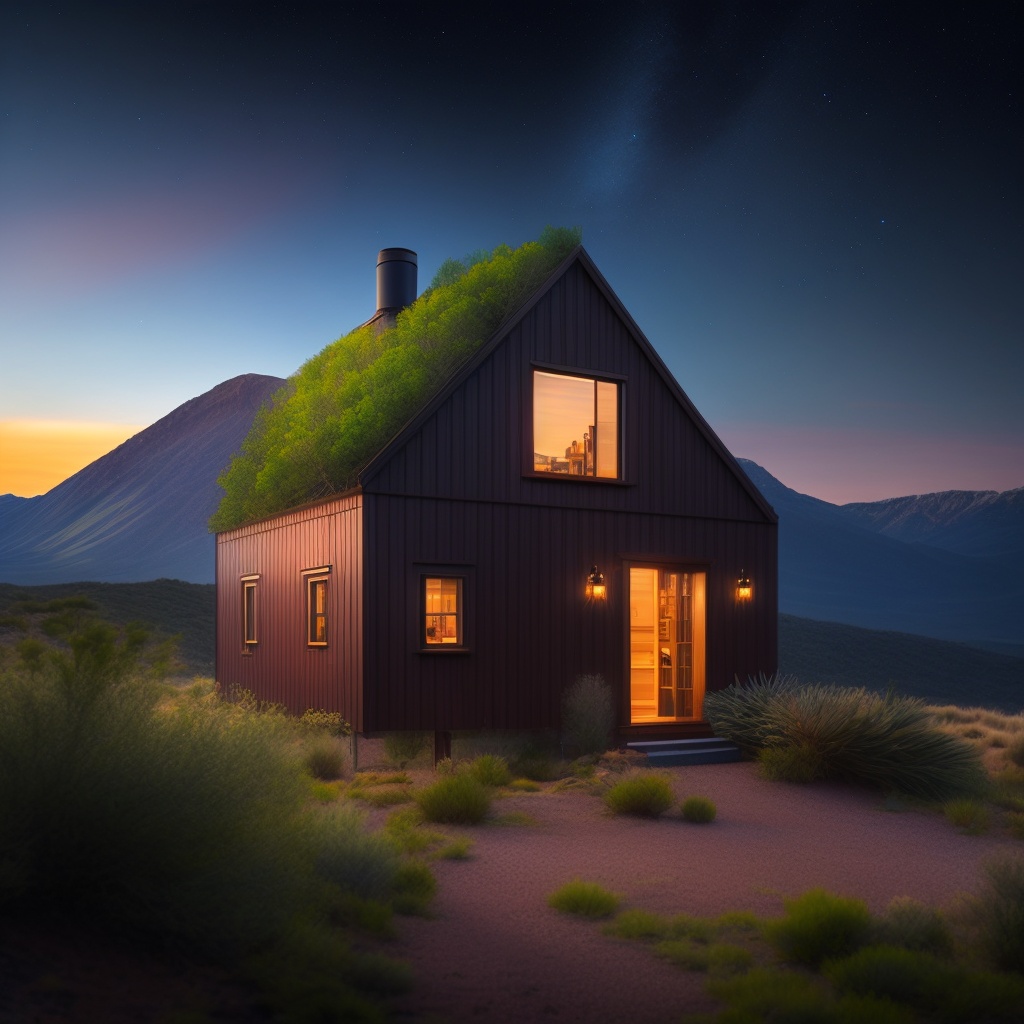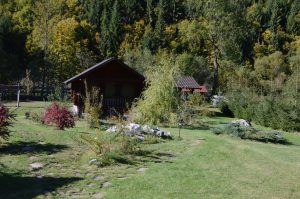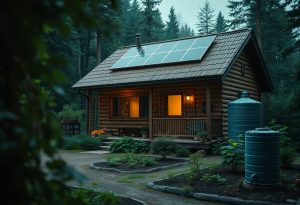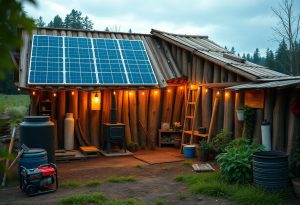Building Off the Grid: Introduction
Are you tired of the constant bustle of city life, traffic jams, and the never-ending buzz of your phone? You may have thought about building off the grid, getting away from it all, and living on your own terms. I hear you, and let me tell you, it can be done and incredibly rewarding. So let’s take a journey together, a journey off the grid. I’ll walk you through what you need to know and the preparations you’ll need to make and give you some pointers to make the process smoother. Buckle up; it’s going to be a wild ride.
What Does Building Off the Grid Mean?
Off-grid living is about freedom, autonomy, and self-sustainability. It’s about building a life that isn’t tied to public utilities, water and sewer lines, or the electric grid. It’s about finding new ways to power your home, to get the water you need, and to handle waste. And above all, it’s about living life on your own terms.
Benefits of Building Off the Grid
Building off the grid comes with a whole host of benefits. There’s the freedom, of course, and the peace that comes from living in tune with the environment. But there’s also the practical side of things: you’re no longer dependent on the grid for your needs, which means no more power outages, no more worrying about water supply issues, and no more monthly utility bills. How good does that sound?
Challenges of Building Off the Grid
Off-grid living isn’t all sunshine and rainbows. It’s hard work and requires a significant investment of time and money. You need to understand and comply with local building codes and environmental regulations. The power supply can be unpredictable, and you must be prepared to handle your water and waste. And, of course, there’s the isolation – it’s a quiet life, and not everyone is cut out for it.
Planning for Your Off-Grid Lifestyle
When planning for off-grid living, the devil is in the details. You need to think about everything from the location of your new home to the design and the materials you’ll use. And that’s before you even consider power, water, and waste.
Finding the Perfect Location
The first step in planning your off-grid lifestyle is finding the perfect location. You need somewhere that has access to sunlight for solar power, a water source, and preferably a wind source for wind power. If you’re lucky, you may find a place with a stream or river for hydropower. And, of course, you need to be comfortable there – this will be your home, after all.
Designing an Off-Grid Home
Designing an off-grid home is a unique challenge. You need to think about how to make the most of natural light and heat, keep the place cool in summer, and incorporate renewable power sources. Plus, you need to think about water collection and waste management systems.
Sustainable Building Materials
Building off the grid is about more than just self-sustainability; it’s about sustainability in a broader sense. That means considering the environmental impact of the materials you use. Reclaimed wood, straw bales, and rammed earth are all excellent, eco-friendly options. Even repurposed shipping containers can make fantastic off-grid homes.
Energy Efficient Design
The design of your home can play a significant role in its energy efficiency. A good design can help to keep your home warm in winter and cool in summer, reducing your need for additional heating or cooling. This is where concepts like passive solar design come in. By positioning your home and windows to take advantage of the sun’s path across the sky, you can maximize your heat gain in winter and minimize it in summer.
Understanding Building Codes and Legal Requirements
One of the biggest challenges when building off the grid is understanding and complying with building codes and legal requirements. These can vary widely depending on your location, so it’s essential to do your research. Some areas have restrictions on off-grid homes, while others may have specific requirements around things like septic systems and power supplies.
Powering Your Off-Grid Home
Power is one of the biggest challenges for off-grid living. Without a connection to the grid, you’ll need to find alternative ways to generate the electricity you need.
Solar Power
Solar power is a popular option for off-grid homes. With an off grid solar system system, you can generate and store your own electricity. The amount of power you can generate will depend on your location and the size of your system. Still, it can be a reliable and cost-effective option in many cases.
Understanding Solar Panels
Solar panels work by converting sunlight into electricity. The electricity can be used straight away, or it can be stored in batteries for later use. The efficiency of your solar panels can be affected by several factors, including their orientation, the amount of sunlight they receive, and the temperature.
Solar Power Maintenance
While solar power systems are generally low-maintenance, they do require some care. Panels should be kept clean and free of debris, and the system should be checked regularly for any signs of damage or wear and tear.
Wind Power
Wind power can be an excellent option for off-grid living, particularly in a location with consistent wind. Wind turbines convert the wind’s kinetic energy into electricity, which can be used immediately or stored for later use.
Understanding Wind Turbines
Wind turbines use the wind to turn a rotor, which drives a generator to produce electricity. The efficiency of a wind turbine can be affected by several factors, including its location, the wind speed, and the design of the turbine.
Wind Power Maintenance
Like solar power systems, wind turbines require some maintenance. This can include regular inspections, lubrication of moving parts, and occasional repairs.
Hydro Power
If you’re fortunate enough to have a flowing water source on your property, hydropower could be a viable option. A micro-hydro system uses water flow to turn a turbine and generate electricity.
Understanding Micro-hydro Systems
Micro-hydro systems are similar to wind turbines, but instead of using the wind to turn a rotor, they use the flow of water. The amount of electricity a micro-hydro system can produce will depend on the flow rate and the height of the water drop, known as the ‘head.’
Hydro Power Maintenance
Micro-hydro systems are generally low-maintenance but must be checked regularly for blockages and signs of wear and tear.
Water and Waste Management
Living off the grid means finding new ways to manage water and waste.
Rainwater Harvesting and Storage
Rainwater harvesting is a simple and effective way to collect and store water for your needs. It involves collecting the water that falls on your roof and storing it in a tank or barrels. The water can be used for washing, cleaning, and even drinking with the proper treatment.
Composting Toilets and Greywater Systems
Off-grid living often means rethinking waste. Composting toilets are a popular option, turning human waste into nutrient-rich compost that can be used in the garden. Greywater systems take it a step further, recycling the wastewater from your sinks, showers, and washing machine for use in the garden.
Understanding Greywater Systems
Greywater systems collect the wastewater from your home, filter it, and redirect it for use in your garden. They’re a great way to reduce your water usage and make the most of a precious resource.
Growing and Preserving Food
Part of the appeal of off-grid living is the opportunity to grow and preserve your own food.
Planting a Vegetable Garden
A vegetable garden is a great way to supplement your food supply with fresh, organic produce. Plus, it’s a rewarding hobby. And who knows? You might find you have a green thumb.
Understanding Permaculture
Permaculture is a design system for sustainable living and farming. It involves creating systems that are self-sufficient and mimic the patterns found in nature. In a permaculture garden, each plant has a purpose, whether it’s for food, to attract beneficial insects, or to improve the soil.
Raising Livestock
If you have the space and the inclination, raising livestock can be a rewarding part of off-grid living. Chickens can provide eggs, goats can provide milk, and both can help to keep your land clear.
Choosing the Right Livestock
Choosing suitable livestock for your situation depends on several factors, including the amount of space you have, your climate, and your needs. Chickens are a good choice for beginners, while goats, sheep, and even cows may be options for those with more land.
Thriving, Not Just Surviving, Off the Grid
Living off the grid is about more than just survival – it’s about thriving. It’s about building a life that aligns with your values and gives you a sense of purpose and fulfillment.
Building a Strong Community
Even off the grid, community is important. Whether it’s your immediate family, your neighbors, or an online community of like-minded folks, having a support network can make all the difference when it comes to living a successful off-grid life.
Networking and Community Building
Building a solid community involves networking and making connections. Whether attending local events, joining online forums, or simply being a good neighbor, there are plenty of ways to build and nurture your community.
Staying Connected While Disconnected
Living off the grid doesn’t mean being cut off from the world. With the right technology, you can stay connected and access the information and entertainment you need.
Off-Grid Internet and Communication Options
There are several ways to get the internet off the grid, from satellite internet to cell signal boosters. And when the internet isn’t an option, there’s always good old-fashioned radio.
Building Off the Grid: Conclusion
Living off the grid is a big step, but it’s a journey worth taking. It’s about freedom, sustainability, and living life on your own terms. It can be hard work, but the rewards are immense. So take the plunge, and start building your off-grid dream today.
Building Off the Grid: Frequently Asked Questions
Is living off the grid legal?
Yes, but the specifics can vary depending on local laws and regulations. It’s always a good idea to research and check with local authorities before you start building.
How much does it cost to go off the grid?
The cost can vary widely depending on your lifestyle, the location, and the type of home you want to build. However, once you’re set-up, your ongoing costs can be significantly lower than living on the grid.
What skills do I need to live off the grid?
Living off the grid requires various skills, from building and maintenance to gardening and animal care. The good news is that most of these skills can be learned, and plenty of resources are available to help you.
Is off-grid living a lonely life?
It can be, but it doesn’t have to be. Even off the grid, you can build a strong community and stay connected with the wider world.
Can I still have internet off the grid?
Absolutely. Satellite internet, mobile data, and even off-grid internet services can all provide internet access in off-grid locations.





Pingback: Living Off the Grid Communities: A Practical Guide
Pingback: Sustainable Architecture: A Guide to the Future of Design
Pingback: Eco Friendly Gifts: A Sustainable Guide | Eco Life Wise
Pingback: Eco Friendly Phone Cases: Smart For a Sustainable Lifestyle
Pingback: Self Sustaining Homes: Why You Need One Today! | Eco Life Wise
Pingback: How Do Self-sustaining Buildings Manage Energy Consumption? | Eco Life Wise
Pingback: Self Sustaining Ecosystem: 10 of Natures Most Ingenious Secrets | Eco Life Wise
Pingback: How Does Self-Sustaining Architecture Differ From Traditional Architecture? 7 Big Ways | Eco Life Wise
Pingback: How Do Self-sustaining Homes Differ From Regular Homes? | Eco Life Wise
Pingback: History of Recycling: 10 Concepts on the Journey From Trash to Treasure
Pingback: Off Grid Air Conditioner: A Green Solution to Beat the Heat
Pingback: What is Permaculture? 10 Steps to Our Greener Future | Eco Life Wise
Pingback: Benefits of Recycling: 10 Simple Ways to Maximize Your Impact for a Greener Planet
Pingback: Sustainable Living: 8 Practical Benefits of the Sustainable Lifestyle | Eco Life Wise
Pingback: Self Sustainable Homes: 7 Practical Reasons Why You Need One Today! | Eco Life Wise
Pingback: How Do Self-sustaining Homes Manage Water And Waste? 10 Important Factors | Eco Life Wise
Pingback: What Is A Green Building? | Eco Life Wise
Pingback: What Is Sustainable Fashion? 9 Interesting Definitions | Eco Life Wise
Pingback: What Is A Sustainable Diet? 10 Factors to Consider | Eco Life Wise
Pingback: How Can I Encourage My Community To Be More Eco-friendly? | Eco Life Wise
Pingback: How to Live Off the Grid: Your Ultimate Guide
Pingback: Why Is Sustainable Agriculture Important: 10 Simple But Vital Reasons | Eco Life Wise